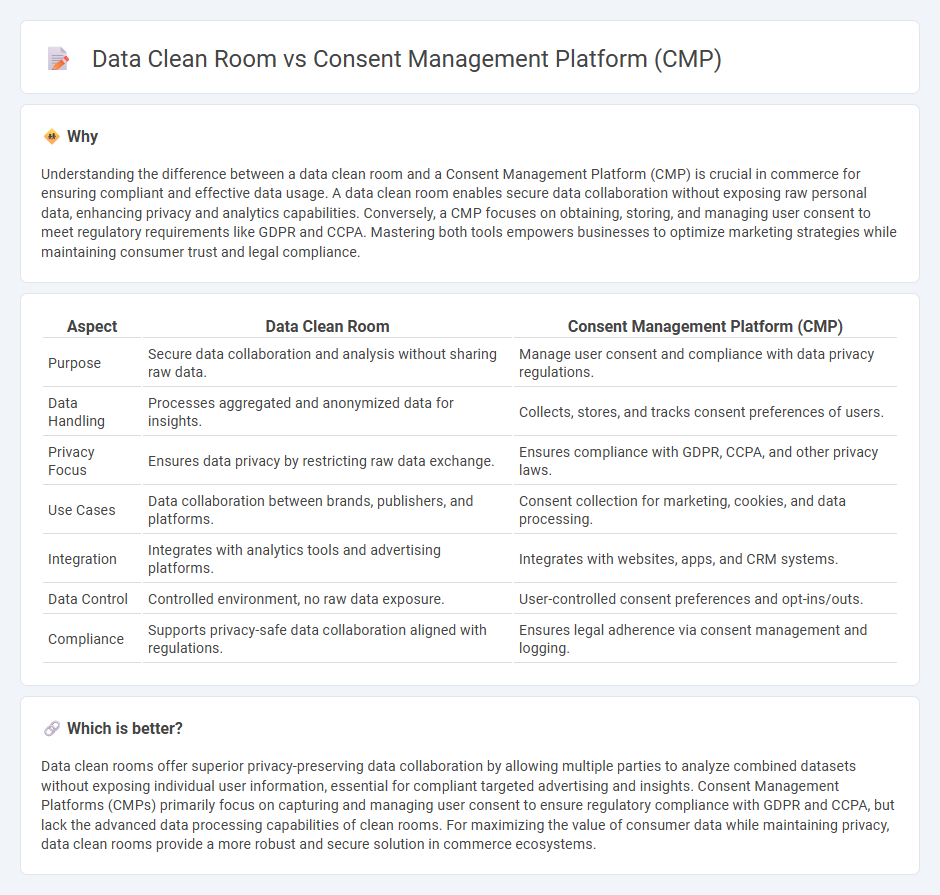
Data clean rooms offer secure environments for aggregating and analyzing customer data without compromising privacy, enhancing data collaboration across multiple parties. Consent Management Platforms (CMPs) streamline the collection and management of user permissions to ensure compliance with data protection regulations like GDPR and CCPA. Explore further to understand how these technologies transform commerce through responsible data usage.
Why it is important
Understanding the difference between a data clean room and a Consent Management Platform (CMP) is crucial in commerce for ensuring compliant and effective data usage. A data clean room enables secure data collaboration without exposing raw personal data, enhancing privacy and analytics capabilities. Conversely, a CMP focuses on obtaining, storing, and managing user consent to meet regulatory requirements like GDPR and CCPA. Mastering both tools empowers businesses to optimize marketing strategies while maintaining consumer trust and legal compliance.
Comparison Table
| Aspect | Data Clean Room | Consent Management Platform (CMP) |
|---|---|---|
| Purpose | Secure data collaboration and analysis without sharing raw data. | Manage user consent and compliance with data privacy regulations. |
| Data Handling | Processes aggregated and anonymized data for insights. | Collects, stores, and tracks consent preferences of users. |
| Privacy Focus | Ensures data privacy by restricting raw data exchange. | Ensures compliance with GDPR, CCPA, and other privacy laws. |
| Use Cases | Data collaboration between brands, publishers, and platforms. | Consent collection for marketing, cookies, and data processing. |
| Integration | Integrates with analytics tools and advertising platforms. | Integrates with websites, apps, and CRM systems. |
| Data Control | Controlled environment, no raw data exposure. | User-controlled consent preferences and opt-ins/outs. |
| Compliance | Supports privacy-safe data collaboration aligned with regulations. | Ensures legal adherence via consent management and logging. |
Which is better?
Data clean rooms offer superior privacy-preserving data collaboration by allowing multiple parties to analyze combined datasets without exposing individual user information, essential for compliant targeted advertising and insights. Consent Management Platforms (CMPs) primarily focus on capturing and managing user consent to ensure regulatory compliance with GDPR and CCPA, but lack the advanced data processing capabilities of clean rooms. For maximizing the value of consumer data while maintaining privacy, data clean rooms provide a more robust and secure solution in commerce ecosystems.
Connection
Data clean rooms and Consent Management Platforms (CMPs) are connected through their shared goal of enabling compliant and privacy-focused data collaboration in commerce. CMPs collect, manage, and document user consent for data processing, ensuring adherence to regulations like GDPR and CCPA. Data clean rooms utilize this consented data to perform secure, anonymized analysis and audience insights without exposing personally identifiable information, enhancing targeted marketing and measurement capabilities.
Key Terms
User Consent
A Consent Management Platform (CMP) collects, stores, and manages user consent preferences to ensure compliance with privacy regulations like GDPR and CCPA, enabling transparent user consent tracking for data processing activities. In contrast, a data clean room provides a secure environment for aggregating and analyzing anonymized user data from multiple sources without exposing personally identifiable information, focusing on privacy-preserving data collaboration rather than explicit consent collection. Explore more about how CMPs and data clean rooms shape privacy strategy and user trust in digital ecosystems.
Data Privacy
Consent Management Platforms (CMPs) enable organizations to collect, manage, and store user consents in compliance with data privacy regulations such as GDPR and CCPA. Data clean rooms provide a secure environment for collaborating on aggregated and anonymized data without exposing personal information, enhancing privacy during data analysis and marketing attribution. Explore how these tools can strengthen your data privacy strategy and ensure regulatory compliance.
Data Collaboration
Consent Management Platforms (CMP) enable businesses to collect, manage, and document user consent for data processing, ensuring compliance with privacy regulations such as GDPR and CCPA. Data clean rooms facilitate secure data collaboration by allowing multiple parties to analyze combined datasets without sharing raw data, preserving user privacy while generating actionable insights. Explore further to understand how integrating CMPs with data clean rooms can enhance privacy-centric data collaboration strategies.
Source and External Links
10 of the best Consent Management Platforms (CMPs) - What is a consent management platform? - A CMP is software that helps websites collect and manage user consent for personal data processing, ensuring compliance with regulations like GDPR and CCPA by tracking preferences, controlling cookie use, and maintaining consent records.
The leading Consent Management Platform (CMP) for GDPR - consentmanager offers an easy-to-integrate, GDPR and ePrivacy compliant CMP solution certified by Google, customizable in over 30 languages, and compatible with over 2,500 tools to help websites comply legally with consent laws.
The 11 Best Consent Management Platforms (Updated!) - CMPs categorize cookies, show consent popups, block trackers if consent is denied, and keep audit logs of user preferences, also enabling managing consent across multiple owned websites for compliance with privacy laws.
 dowidth.com
dowidth.com